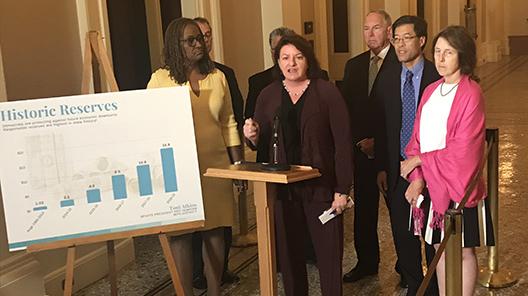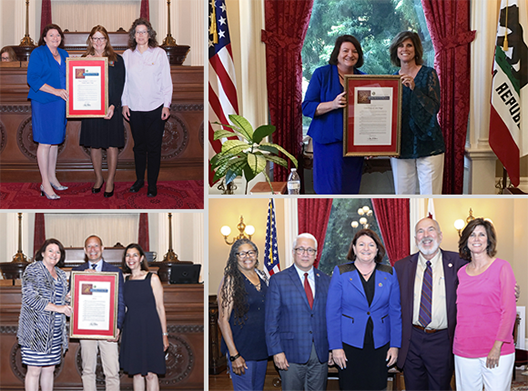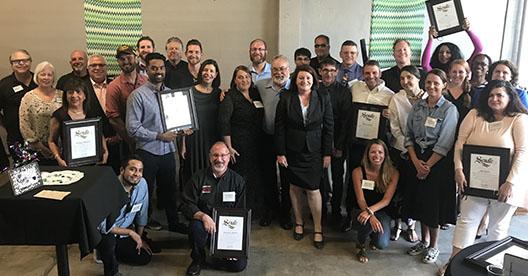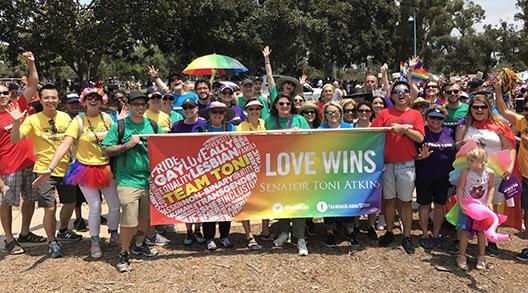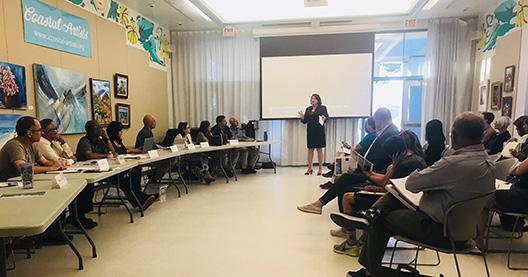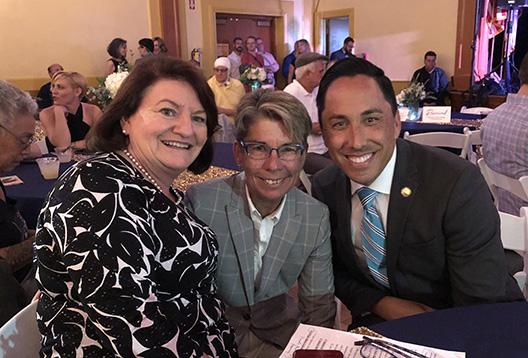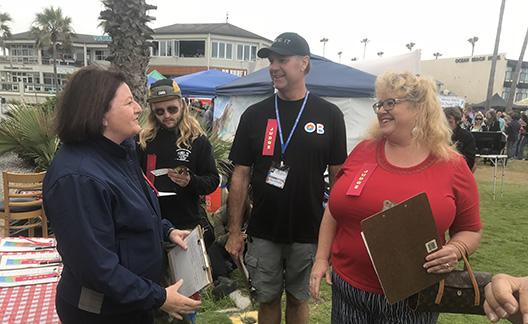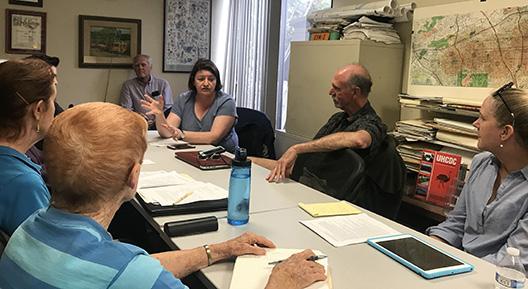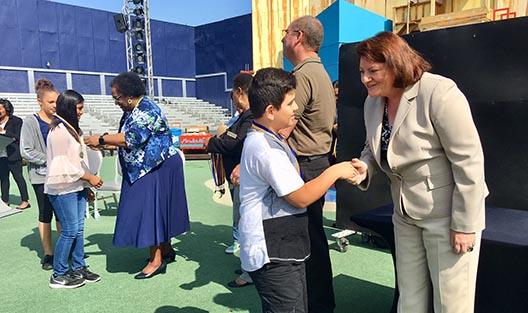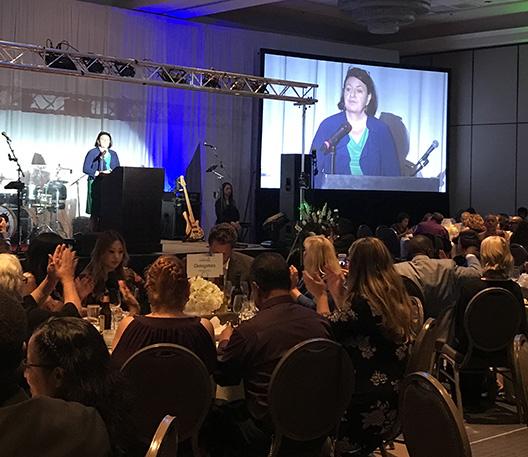July 2018 Newsletter
This past Wednesday, I watched as Governor Jerry Brown signed his 16th and last budget for the state of California. As the Senate Leader, I’m proud of what we’ve been able to accomplish for the people of our state.
The Governor’s current tenure began the same year I joined the Legislature, and crafting that first budget was an awful experience that I hope no one ever has to endure again. We were forced to make drastic cuts in important programs in order to close a nearly $27-billion deficit.
|
|
As the economy rebounded from the Great Recession, we gradually restored many of those decimated programs and began saving money in reserve to make it easier to absorb the shock of the next downturn.
The budget that becomes effective on July 1 reflects the strongest fiscal outlook our state has seen in a generation. It brings our reserves to nearly $16 billion and at the same time invests heavily in programs that help lift up our residents who are still struggling despite the strong economy.
This budget invests the highest level of funding in our public schools and higher-education systems that California has ever seen. It responds to the new reality of increasingly frequent and intense wildfires with nearly $1 billion for prevention and recovery efforts. It bolsters proven poverty-reduction programs like the Earned Income Tax Credit. It includes $500 million in emergency aid for our local communities to respond to the widespread humanitarian calamity of homelessness.
No budget is absolutely perfect, but, simply put, this one is great. And while the high-dollar statewide allocations grab the headlines, significant state resources are coming home to San Diego County to strengthen our economy, resident services, infrastructure and environmental protection.
For example: $866 million to repair our transportation systems, nearly $33 million of emergency homelessness aid, $30 million for San Diego’s groundbreaking Pure Water program, $50,000 to the San Diego River Conservancy, a portion of $15 million to combat a couple of insects that are harming our avocado and citrus groves, a portion of $10.1 million to our coastal communities to address sea-level rise and other climate-change impacts and a portion of $20 million for urban greening and urban forestry.
There’s also $1.5 million for the San Diego Maritime Museum to redevelop and enhance the site where the Star of India and its other ships are displayed, $2 million for a project in Imperial Beach that includes a new swimming pool for high-school athletes and the South Bay community and $250,000 for the San Diego Unified School District to continue an important program that supports homeless students.
I’m also thrilled that the budget includes funding for one of my bills, SB 945, which removes an arbitrary cap on treatment in a state program for patients suffering from breast cancer or cervical cancer. Now, everyone in the program who continues to need care will receive it.
It’s a budget like this that makes me proud to be a public servant. Instead of agonizing over which programs to cut in order to balance our finances, we’re extending educational opportunities, expanding access to health care, providing housing, repairing our infrastructure, strengthening the social safety net and protecting our natural environment.
These are the building blocks for a higher quality of life for all San Diegans and all Californians.
In 2017, the first year of the current two-year session, Governor Jerry Brown signed all 12 of my bills that were sent to him by the Legislature. The biggest of those was SB 2, which created a permanent source of funding for affordable housing. The first-year funding for SB 1 – estimated at $250 million – is currently being collected and will soon be distributed to San Diego and all other regions across California. Here is a rundown of the legislation I have introduced in 2018:
SB 945: In 2016, Governor Brown signed my bill AB 1795, providing uninsured and underinsured Californians with expanded access to treatment for breast cancer and cervical cancer. SB 945 builds on AB 1795 by removing arbitrary time limits for care. Currently, the state Breast and Cervical Cancer Treatment Program stops providing medical care for breast cancer after 18 months and cervical cancer after 24 months, regardless of medical need. SB 945 removes those limits and requires continuation of treatment as long as necessary. SB 945 cleared the Assembly Health Committee in June. Funding for the bill is included in the new state budget that takes effect on July 1.
SB 970: Hotels and motels are ground zero for human traffickers, which means they’re hiding their criminal activities in plain sight. SB 970 will require all hotels and motels in California to provide training for their employees on how to spot the signs of human trafficking and report those signs to law enforcement. SB 970 cleared the Assembly Labor and Employment Committee in June.
SB 1005: Sometimes, survivors of domestic abuse who must flee their home to get away from their abuser can’t afford the extra rent or deposit required to move their dog or cat into a new apartment. SB 1005 makes explicitly clear that survivors of violent crimes, such as domestic violence, may use state-provided victim-relocation funds to which they are already entitled to pay for expenses related to housing an animal companion. SB 1005 cleared the Assembly Public Safety and Appropriations committees in June.
SB 1086: Thanks to AB 1035, passed in 2014, if a public-safety officer dies from a job-related illness more than 240 weeks after being diagnosed, his or her family can still qualify for state-provided survivor death benefits. The bill stretched that statute of limitations to 420 weeks. However, AB 1035 is scheduled to sunset in 2019. My bill, SB 1086, removes the sunset and makes the 420-week limit permanent. A police officer or firefighter’s family should not have to suffer because she or he lived too long. SB 1086 cleared the Assembly Insurance Committee in June.
SB 1125: Currently, if a patient receives treatment through Medi-Cal at a community health center from both a medical provider and a mental-health specialist on the same day, the state will reimburse the center for only one visit. A patient must seek mental-health treatment on a subsequent day in order for that treatment to be reimbursed as a second visit. There’s no good reason for that. SB 1125 allows health centers to bill Medi-Cal for both visits, even if they occur on the same day. This change will ensure that more people get the mental-health services they need. SB 1125 cleared the Assembly Health Committee in June.
SB 1367: This bill follows up on two of my previous bills – AB 392, which made the San Diego River Conservancy permanent, and SB 214, which strengthened the conservancy’s capacity to protect and enhance the San Diego River watershed. SB 1367 gives the San Diego River Conservancy the power to help protect and enhance other nearby rivers – the Otay, Sweetwater, and Tijuana rivers – and their watersheds by helping identify and pursue funding sources, developing strategic plans, and working with local nonprofits and government agencies. SB 1367 cleared the Assembly Natural Resources Committee in June.
SB 1125: Currently, if a patient receives treatment through Medi-Cal at a community health center from both a medical provider and a mental-health specialist on the same day, the state will reimburse the center for only one visit. A patient must seek mental-health treatment on a subsequent day in order for that treatment to be reimbursed as a second visit. There’s no good reason for that. SB 1125 allows health centers to bill Medi-Cal for both visits, even if they occur on the same day. This change will ensure that more people get the mental-health services they need. SB 1125 cleared the Senate Appropriations Committee and the Senate floor in May and was sent to the Assembly.
SB 1367: This bill follows up on two of my previous bills – AB 392, which made the San Diego River Conservancy permanent, and SB 214, which strengthened the conservancy’s capacity to protect and enhance the San Diego River watershed. SB 1367 gives the San Diego River Conservancy the power to help protect and enhance other nearby rivers – the Otay, Sweetwater, and Tijuana rivers – and their watersheds by helping identify and pursue funding sources, developing strategic plans, and working with local nonprofits and government agencies. SB 1367 cleared the Senate Appropriations Committee and the Senate floor in May and was sent to the Assembly.
|
Honoring San Diegans at the Capitol |
|
|
June was a big month for celebrating the work of some very worthy San Diegans at the state Capitol. Clockwise from top left: retired Army Major Veronica Zerrer, Veteran of the Year; Deb Martin of ElderHelp, Nonprofit of the Year; Phyllis Jackson (San Diego Pride), Alberto Cortes (Mama’s Kitchen), Terry Cunningham (California HIV/AIDS Research Program) and Deb Martin (ElderHelp), as well as Benjamin Dillingham (political organizer, in memoriam) for their work in the LGBTQ community; and Jon Bailey and Indra Gardiner Bowers of i.d.e.a., the Small Business of the Year. Congratulations and thank you to all of the honorees!
|
|
On June 21, I had the pleasure of hosting an event to honor more than a dozen small businesses throughout the 39th District. Small businesses power our economy and help create the character of our communities, and I couldn’t be more grateful for everything they do. Thank you to 37ECB school in San Diego for providing the wonderful venue, Venice Pizza House for providing the delicious food and the El Cajon Boulevard Business Improvement District for all of their assistance.
Here is the list of incredible businesses that we honored: Buona Forchetta, Café Coyote, Coronado Times, ACE Hardware, El Comal Restaurant, Grah Safe & Lock, Harley Gray, i.d.e.a., Kensington Café, Lestat’s, LIPS, Modern Times Beer, Pesto Italian Craft Kitchen, Root 75 Flower Shop, San Diego Fly Rides, Tradesmen Pourhouse and Unicorn Jewelers.
I am once again extremely excited to join many thousands of San Diegans in celebrating LGBT Pride!
|
|
I am a proud member of the Legislative LGBT Caucus, the largest and most effective LGBT caucus in the country. And every year, California leads the nation by expanding equality and civil rights.
A prime example of that was my 2017 bill, SB 179 – the Gender Recognition Act. Signed by the Governor last October, the law created a new, nonbinary gender marker for state-issued identity documents and made it easier for transgender, intersex and nonbinary residents to obtain state documents that accurately reflect their identity. I remain incredibly proud of this landmark legislation, because I know how important it is for Californians who shouldn’t have to cope with the stress and hardship of having an ID that doesn’t match who they truly are.
Happily, California isn’t the only place where progress is being made. In 2017, numerous LGBTQ candidates were elected to public office across the country, including Danica Roem, a transgender woman who won a seat in the House of Delegates in my home state of Virginia! I am proud and excited to welcome her to San Diego as the keynote speaker at the Spirit of Stonewall Rally on Friday, July 13.
San Diego has a wonderful history as a place where LGBTQ individuals rise up and lead, and that makes me enormously proud of our great city. In keeping with the theme of this year’s celebration, we will Persist with Pride. Let’s celebrate our achievements and, above all, have a great time. Happy Pride, San Diego!
My district staff is always available to help constituents navigate a complex web of state agencies.
But sometimes the assistance we provide is much simpler, but no less important. For example, recently, a 90-year-old woman who was having difficulty with the phone she received through the California LifeLine Program visited our office seeking help, and two members of my staff sat down with her and helped her activate the LifeLine service and navigate the phone itself. Constituent support doesn’t get more direct than that!
If you’re having trouble working out an issue with any state agency, please call my office at 619-645-3133, and my staff will do everything in their power to help.
|
My District Staff |
Where to Find Me Online
|
My district office is located at 1350 Front St., Room 4061, San Diego, CA 92101.
|
|
|
|
|
|
|
|
|
|
|
|

